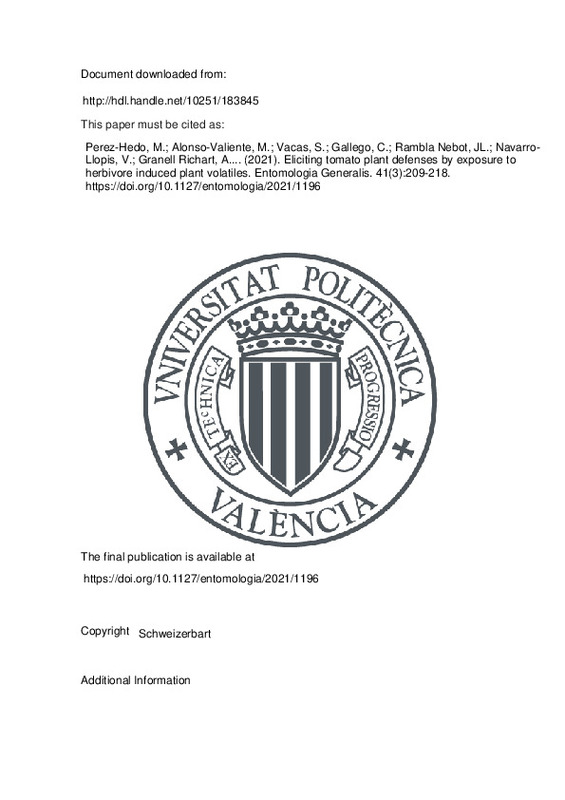JavaScript is disabled for your browser. Some features of this site may not work without it.
Buscar en RiuNet
Listar
Mi cuenta
Estadísticas
Ayuda RiuNet
Admin. UPV
Eliciting tomato plant defenses by exposure to herbivore induced plant volatiles
Mostrar el registro sencillo del ítem
Ficheros en el ítem
| dc.contributor.author | Perez-Hedo, Meritxell
|
es_ES |
| dc.contributor.author | Alonso-Valiente, Miquel
|
es_ES |
| dc.contributor.author | Vacas, Sandra
|
es_ES |
| dc.contributor.author | Gallego, Carolina
|
es_ES |
| dc.contributor.author | Rambla Nebot, Jose Luis
|
es_ES |
| dc.contributor.author | Navarro-Llopis, Vicente
|
es_ES |
| dc.contributor.author | GRANELL RICHART, ANTONIO
|
es_ES |
| dc.contributor.author | Urbaneja García, Alberto
|
es_ES |
| dc.date.accessioned | 2022-07-05T18:05:42Z | |
| dc.date.available | 2022-07-05T18:05:42Z | |
| dc.date.issued | 2021 | es_ES |
| dc.identifier.issn | 0171-8177 | es_ES |
| dc.identifier.uri | http://hdl.handle.net/10251/183845 | |
| dc.description.abstract | [EN] When zoophytophagous mirids (Hemiptera: Miridae) feed on tomato plants they activate both direct and indirect defense mechanisms, which include the release of herbivore induced plant volatiles (HIPVs). HIPVs are capable of activating defense mechanisms in healthy neighboring plants. In this work, we investigated which of these mirid-induced HIPVs are responsible for inducing plant defenses. Healthy tomato plants were individually exposed to eight HIPVs [1-hexanol, (Z)-3-hexenol, (Z)-3-hexenyl acetate, (Z)-3-hexenyl propanoate, (Z)-3-hexenyl butanoate, hexyl butanoate, methyl jasmonate and methyl salicylate] for 24 hours. Then, the expression level of defensive genes was quantified. All HIPVs led to increased expression of defensive genes by the plant when compared to unexposed tomato plants. In a further step, (Z)-3-hexenyl propanoate and methyl salicylate were selected to study the response of four tomato key pests and one natural enemy to tomato plants previously exposed to both HIPVs relative to unexposed control plants. Plants previously exposed to both HIPVs were repellent to Bemisia tabaci (Gennadius) (Hemiptera: Aleyrodidae), Tuta absoluta (Meyrick) (Lepidoptera: Gelechiidae) and Frankliniella occidentalis Pergande (Thysanoptera: Thripidae), attractive to the parasitoid Encarsia formosa Gahan (Hymenoptera: Aphelinidae) and indifferent to Tetranychus urticae Koch (Acari: Tetranychidae). The volatiles emitted by plants previously exposed to both selected volatiles were also determined. Increased levels of C5 and C6 fatty acid-derived volatile compounds and beta-ionone were detected, confirming that both HIPVs significantly activated the lipoxygenase pathway. These results are the starting point to advance the use of volatile compounds as defense elicitors in tomato crops. | es_ES |
| dc.description.sponsorship | The research leading to these results was partially funded by the Spanish Ministry of Economy and Competitiveness MINECO (AGL2014-55616-C3 and RTA201700073-00-00) and the Conselleria d'Agricultura, Pesca i Alimentacio de la Generalitat Valenciana. The authors thank Dr. Alejandro Tena (IVIA) and Alice Mockford (University of Worcester) for helpful comments on earlier versions of the manuscript. | es_ES |
| dc.language | Inglés | es_ES |
| dc.publisher | Schweizerbart | es_ES |
| dc.relation.ispartof | Entomologia Generalis | es_ES |
| dc.rights | Reserva de todos los derechos | es_ES |
| dc.subject | (Z)-3-hexenyl propanoate | es_ES |
| dc.subject | Methyl salicylate | es_ES |
| dc.subject | Tuta absoluta | es_ES |
| dc.subject | Bemisia tabaci | es_ES |
| dc.subject | Frankliniella occidentalis | es_ES |
| dc.subject | Tetranychus urticae | es_ES |
| dc.subject | Encarsia formosa | es_ES |
| dc.subject.classification | BIOQUIMICA Y BIOLOGIA MOLECULAR | es_ES |
| dc.title | Eliciting tomato plant defenses by exposure to herbivore induced plant volatiles | es_ES |
| dc.type | Artículo | es_ES |
| dc.identifier.doi | 10.1127/entomologia/2021/1196 | es_ES |
| dc.relation.projectID | info:eu-repo/grantAgreement/MINECO//AGL2014-55616-C3-1-R/ES/MEJORA DE LA RESILIENCIA DEL CULTIVO MEDIANTE EL AUMENTO DE LA RESPUESTA DE DEFENSA DE LA PLANTA Y ADAPTACION AL CAMBIO CLIMATICO/ | |
| dc.relation.projectID | info:eu-repo/grantAgreement/AEI/PLAN ESTATAL DE INVESTIGACION CIENTIFICA Y TÉCNICA Y DE INNOVACIÓN 2013-2016/RTA2017-00073-00-00/ES/Programas resilientes de gestión de plagas y enfermedades basados en el aumento de la respuesta de defensa de la planta en cultivos hortícolas | |
| dc.rights.accessRights | Abierto | es_ES |
| dc.contributor.affiliation | Universitat Politècnica de València. Instituto Universitario Mixto de Biología Molecular y Celular de Plantas - Institut Universitari Mixt de Biologia Molecular i Cel·lular de Plantes | es_ES |
| dc.contributor.affiliation | Universitat Politècnica de València. Instituto Agroforestal Mediterráneo - Institut Agroforestal Mediterrani | es_ES |
| dc.description.bibliographicCitation | Perez-Hedo, M.; Alonso-Valiente, M.; Vacas, S.; Gallego, C.; Rambla Nebot, JL.; Navarro-Llopis, V.; Granell Richart, A.... (2021). Eliciting tomato plant defenses by exposure to herbivore induced plant volatiles. Entomologia Generalis. 41(3):209-218. https://doi.org/10.1127/entomologia/2021/1196 | es_ES |
| dc.description.accrualMethod | S | es_ES |
| dc.relation.publisherversion | https://doi.org/10.1127/entomologia/2021/1196 | es_ES |
| dc.description.upvformatpinicio | 209 | es_ES |
| dc.description.upvformatpfin | 218 | es_ES |
| dc.type.version | info:eu-repo/semantics/publishedVersion | es_ES |
| dc.description.volume | 41 | es_ES |
| dc.description.issue | 3 | es_ES |
| dc.relation.pasarela | S\440164 | es_ES |
| dc.contributor.funder | Ministerio de Economía y Competitividad |







![[Cerrado]](/themes/UPV/images/candado.png)

